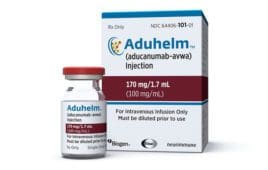 Cambridge, Massachusetts–based biopharma Scholar Rock has been making encouraging progress in the development of apitegromab, a potential new therapy for spinal muscular atrophy (SMA), a genetic disease characterized by progressive muscle weakness and atrophy. Apitegromab, a novel monoclonal antibody, works through a unique mechanism of action — it binds to and inhibits the precursor form of myostatin, specifically targeting inactive promyostatin and latent myostatin. By preventing activation of myostatin, apitegromab enables increased muscle growth and strength.
Cambridge, Massachusetts–based biopharma Scholar Rock has been making encouraging progress in the development of apitegromab, a potential new therapy for spinal muscular atrophy (SMA), a genetic disease characterized by progressive muscle weakness and atrophy. Apitegromab, a novel monoclonal antibody, works through a unique mechanism of action — it binds to and inhibits the precursor form of myostatin, specifically targeting inactive promyostatin and latent myostatin. By preventing activation of myostatin, apitegromab enables increased muscle growth and strength.
The company’s recently completed phase 2 TOPAZ trial demonstrated that apitegromab, a novel monoclonal antibody inhibiting myostatin, improved motor function and increased muscle mass and strength in SMA patients across multiple outcome measures. Further data from a 36-month extension of the trial provided strong evidence for the sustained effectiveness and safety of apitegromab. The therapy not only maintained motor function improvements but also continued enhancing patient-reported fatigue levels and daily activity performance over the extended period. With a retention rate exceeding 90% of nonambulatory patients, the study highlighted apitegromab’s tolerability and promising efficacy. Encouraged by these positive results, Scholar Rock has begun a phase 3 trial with the goal of establishing apitegromab as the first muscle-directed therapy for SMA patients. It anticipates full enrollment in Q3 2023.
SMA has seen significant recent advances in treatment options in recent years, including FDA-approved therapies such as Spinraza, Zolgensma and Evrysdi that target motor neuron preservation. But unmet medical need remains high as Scholar Rock’s CEO Dr. Jay Backstrom explained in a recent interview.
In the conversation, Backstrom examined the trial findings and the company’s plans to advance apitegromab through late-stage trials. He also discussed apitegromab’s potential to improve SMA treatment by addressing muscle loss, an important issue that other therapies do not directly target.
How does the recent data from Scholar Rock’s TOPAZ Phase 2 clinical trial, which demonstrates long-term substantial and sustained improvement of motor function in patients with nonambulatory spinal muscular atrophy (SMA), complement existing SMA treatments?

Dr. Jay Backstrom
Backstrom: SMA is a genetic disease with motor neuron degeneration, leading to progressive muscle weakness. The field has seen significant advancements recently with three approved therapies targeting motor neuron degeneration, stopping or slowing the progression of the disease. However, unmet need remains significant as the approved therapies do not address the muscle atrophy that has already taken place.
Apitegromab is the first and only investigational muscle-targeted treatment to demonstrate clinical proof of concept in SMA. Apitegromab selectively targets myostatin, which we believe leads to increased muscle function and strength. Data from our TOPAZ Phase 2 trial extension over a 36-month treatment period showed substantial and sustained gains in scores from two scales that measure motor function and strength in patients with nonambulatory Types 2 and 3 SMA: Hammersmith Functional Motor Scale-Expanded (HFMSE) and Revised Upper Limb Module (RULM). These data also showed an improvement in patient-reported outcome measures, including the ability to perform daily activities and a decline in fatigue — another debilitating and under addressed aspect of life for SMA patients.
We believe that apitegromab, as a selective muscle-targeted therapy in the setting of existing SMA therapy, has the potential to be the next transformative therapy for people with SMA. We anticipate that our Phase 3 trial for apitegromab will be fully enrolled in Q3 of this year. As a next step, our focus will be completing the trial and working with regulatory agencies to seek approval to potentially bring the first muscle-targeted treatment in SMA to patients.
Given that more than 90% of nonambulatory patients remained on treatment in the extension study, how does Scholar Rock interpret this high retention rate in terms of patient tolerance and potential effectiveness of apitegromab therapy?
Backstrom: We’re pleased to see that more than 90% of nonambulatory patients remain on treatment. Our new Phase 2 data support apitegromab’s long-term durability of effect and consistent tolerability and safety profile, with no new or serious safety risks identified over 3 years of treatment in our Phase 2 clinical trial, and further strengthens our confidence in its therapeutic potential for patients with SMA.

This graph shows the mean change from baseline over 36 months in four core metrics: HFMSE and RULM (motor function assessments), PEDI-CAT (daily activities capability) and PROMIS-Fatigue (fatigue level). Increases in HFMSE, RULM, and PEDI-CAT, and a decrease in PROMIS-Fatigue indicate improved motor function and quality of life in SMA patients treated with apitegromab.
Filed Under: clinical trials, Drug Discovery, Neurological Disease



